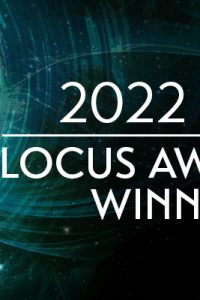Wole Talabi: Nightmare Gods & Beyond
OLUWOLE TALABI was born February, 28, 1986 in a steel town on the outskirts of Warri, a city in the Niger Delta area of Nigeria, and grew up there and in Benin City before his family settled in Lagos. He currently lives in Malaysia, where he works as an engineer, but expects to relocate to Australia in the future.
Talabi’s first SF story was “The Human Thing” (2011), and his first professional publication was “Wednesday’s Story” (2016), which was nominated for the Caine Prize for African Writing. He has since published more than two dozen stories, including Nommo Award winners “The Regression Test” (2017) and “Incompleteness Theories” (2019); Locus award finalist “An Arc of Electric Skin” (2021); and Hugo and Nebula Award nominee “A Dream of Electric Mothers” (2022). Some of his short fiction is collected in Incomplete Solutions (2019), with new collection Convergence Problems forthcoming. His essay “Preliminary Observations from an Incomplete History of African SFF” is a BSFA and Ignyte Awards finalist.
Talabi is also an accomplished editor, with anthologies including Lights Out: Resurrection (2016) and Africanfuturism (2020). He is the editor of the forthcoming Mothersound: The Sauútiverse Anthology, with stories set in a shared world created by the Sauúti Collective, of which Talabi is a founding member.
His debut novel, Shigidi and the Brass Head of Obalufon, was published in August.
Excerpt from the interview:
“Shigidi and the Brass Head of Obalufon is about a nightmare god, a minor deity in the Yoruba pantheon mythology. It’s still an active religion in some places, but it’s also a larger mythology. I reimagined the Yoruba pantheon as a company, a corporate entity, that is trading in faith and belief. If no one believes in gods, then they have no power, so they do their best to generate that belief, the way companies try their best to generate profit in a capitalist system.
“Shigidi hates his job because he’s a nightmare god. If you google a picture of Shigidi, you’ll see a tiny, ugly statue with a big head. That’s what Shigidi looks like: he’s this small, ugly creature whose job is to go around giving people nightmares and killing them. I imagined Shigidi as a disaffected employee who hates his job, but he needs to do it to survive (something I explore a bit more in my most recent novelette ‘Saturday’s Song’, which appeared in Lightspeed). On an assignment, Shigidi meets a succubus named Nneoma, whose powers of manipulation and transformation are rooted in sex. She makes Shigidi an offer to change him and make him into an incubus. He agrees but, of course, the gods in the spirit company are not happy about this – at least, some of them. They have their own internal petty squabbles and power dynamics, and they all have different plans for Shigidi.
“The company comes for Shigidi and Nneoma, and eventually Shigidi and Nneoma have to do a job for one of the elder gods in the company: Steal the brass head of Obalufon – which is a real object, by the way – from the British Museum and bring it back to Nigeria. That’s the basic setup. Along the way, they run into gods from other pantheons, creatures from myth and folklore and magicians too – even Aleister Crowley makes an appearance. When Nneoma meets Aleister, he’s misogynistic, racist, and greedy – all traits the real Aleister Crowley had, based on historical accounts and biographies. The version of Aleister Crowley in the book is quite different, and he plays a small but important part in the story.
“This book represents the convergence of different things that I was thinking about at the time. The first is Shigidi himself, who I’ve always found fascinating. I saw a few Shigidi idols in Nigeria. It’s a thing – people in Nigeria put them in front of their house to stop the nightmares they think their enemies are sending to them. If you make a statue of Shigidi and put it in your house, then no one can send evil nightmares to you to try to kill you in your sleep. Some people use the Shigidi to try and kill others – that’s the belief. I’ve always found this tiny, ugly statue creature really fascinating, along with the mythology around it.
“The rest of the Yoruba pantheon is full of larger-than-life gods: Yemoja, the goddess of the sea; Shango, the god of lightning, who is always imagined as this big, loud, brash character. And so on. Then there’s Shigidi, who’s just this tiny statue giving people nightmares. I’ve always thought, ‘This poor guy – it sounds like a terrible job.’ That’s where I built up this idea of the pantheon as a company and Shigidi having to do this shitty job just to maintain his existence.
“Nneoma is a character that popped into my head fully formed, and she’s a synthesis of a lot of things – quite frankly, a lot of misogynistic things I heard growing up. There is a pervasive global myth, even in Christianity, that all of the evil in this world was brought on by women. It’s Eve that took the apple; it’s Pandora that opened the box. It’s your classic evil temptress. The framing that women ruin the world with their horrible sexuality. In Nigeria, we have a lot of movies, that are obviously religiously inspired, about evil women that are spirits or Mammy Water in disguise, who will tempt men away from their good Christian wives, have sex with them, and steal their souls or condemn them to some horrible fate.
“A lot of that struck me as really misogynistic and wrong, growing up, and I wanted to take that idea and invert it, and make her the main character. Even the name Nneoma (a real Nigerian name) is a reference to a famous Nigerian movie called Nneka, the Pretty Serpent (1994). Nneoma is a riff on that, but I also borrowed elements of Jewish mysticism about the succubus and the first demons that entered the world. She’s a merger of all the Evil Female™ characters you could imagine, like a Jezebel Voltron. She is a co-protagonist with Shigidi, because I kept thinking, ‘A reluctant Nightmare god and misunderstood succubus are a good pairing.’
“I deliberately start off the novel with the two of them being amoral. They do the ‘evil’ things they do because that’s who they are. But, over time, you see their vulnerability, humanity even. I wanted to go against the lot of the stereotypical stuff I heard when I was younger. Even in Nigeria, Shigidi is viewed as an evil god, but I don’t believe in pure evil. I believe in circumstance and people responding to situations. I wanted to dig into that through the story.
“And then there’s the heist at the British Museum, which is the third element that makes the novel, and makes the whole thing cohere in my mind. I used to live in London, but then I left, and I went back in 2018 for the Caine Prize award ceremony, and during that trip we visited the British Museum. and I was looking at it with a different view this time. I love the idea of museums in general, but this time I felt really uncomfortable being there because I was more aware of just how many things in that museum were of questionable provenance, held there against the will of the people that owned them in the first place. If they had been sold fairly, given freely or on loan from a community, that would be different. But, no: most of these things were stolen, including the Brass Head of Obalufon, which has an interesting history of its own.
“It has different names. Some people call it the Bronze Head of Ife. It’s actually not bronze, it’s technically a brass alloy. That’s why I call it the Brass Head, even though most people call it the Bronze Head. It was dug up, I believe, in the 1930s during excavation for new construction in Nigeria and then stolen away. It ended up in the British Museum. When it was being studied, people thought, ‘Oh, the craftsmanship is so good, this is brilliant metalwork,’ and it was dated to about 700-800 years ago. They said, ‘Oh, the craftsmanship is wonderful and amazing and there’s no way Africans created this. Africans don’t do technology – this must have been the work of an ancient Greek colony that migrated here.’ Atlantis was even mentioned! They were reaching that far just to be able to say, Africans did not have the capacity to make something that elegant or with that level of technology and craftsmanship. It reminds me of the pyramids and people thinking aliens must have built them.
Interview design by Stephen H. Segal.
Read the full interview in the August 2023 issue of Locus.
 While you are here, please take a moment to support Locus with a one-time or recurring donation. We rely on reader donations to keep the magazine and site going, and would like to keep the site paywall free, but WE NEED YOUR FINANCIAL SUPPORT to continue quality coverage of the science fiction and fantasy field.
While you are here, please take a moment to support Locus with a one-time or recurring donation. We rely on reader donations to keep the magazine and site going, and would like to keep the site paywall free, but WE NEED YOUR FINANCIAL SUPPORT to continue quality coverage of the science fiction and fantasy field.
©Locus Magazine. Copyrighted material may not be republished without permission of LSFF.









